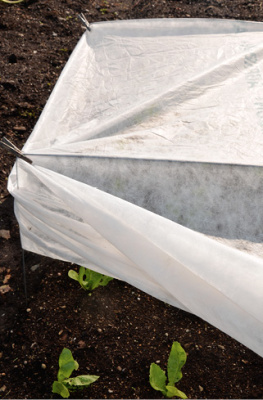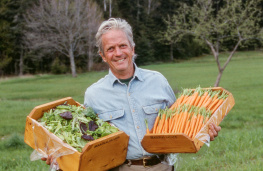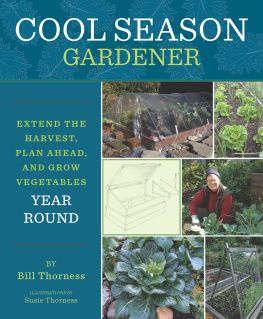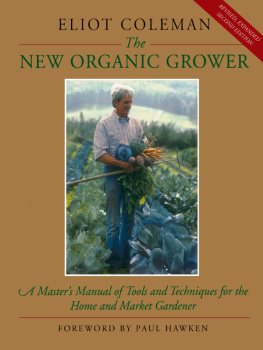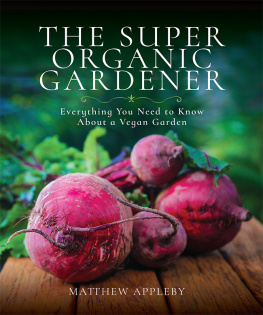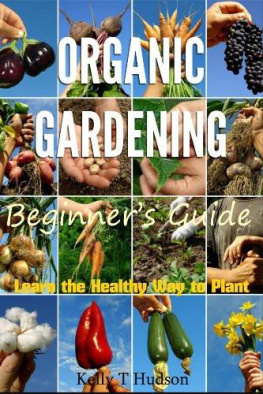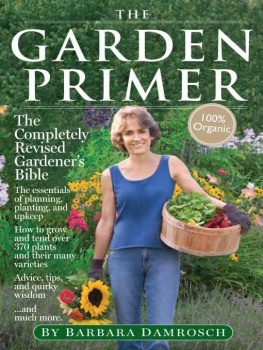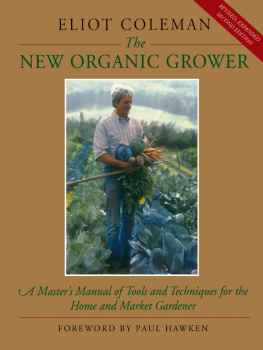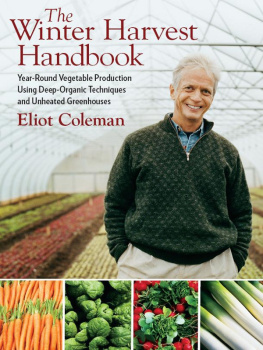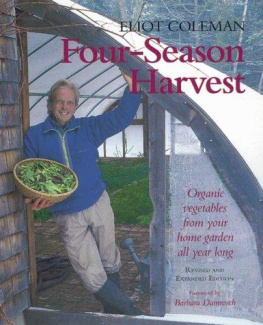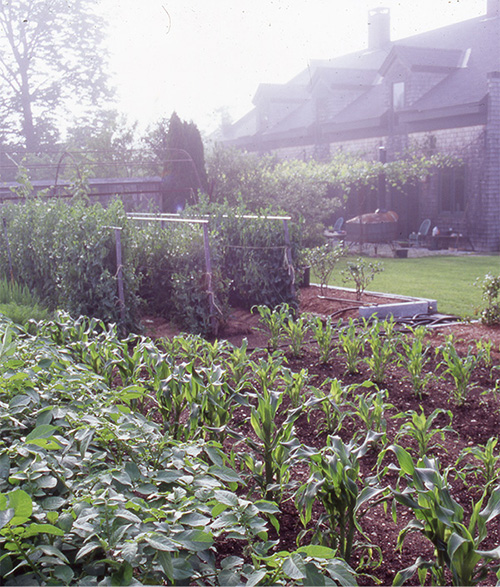The Four Season Farm Gardeners Cookbook
From the Garden to the Table in 120 Recipes
Barbara Damrosch & Eliot Coleman
Workman Publishing New York
Acknowledgments
We would like to thank the many people who lent their talents and good counsel to this project. We have been grateful to the staff of Workman Publishing for their professionalism, wit, and insane work ethic, as they turned this farm-raised product into a book. In particular: Peter Workman, who invited us to write it; our editor Suzanne Rafer, who shepherded it with her usual skill and dedication; Mary Wilkinson for her kindness, wisdom, and tireless dedication to the manuscript. The books designer Lisa Hollander was wonderful to work with, and we thank her and Anne Kerman for their expert handling of the photographyand the photographers. Anne, along with food stylist Carrie Ann Purcell and prop stylist Sara Abalan, made Food-Shoot Week more fun than work. Selina Meere and Anwesha Basu, in publicity, have been helpful and understanding of our various quirks. Appreciation also to Cathy Dorsey, our index whiz; Kathie Ness, whose careful eye oversaw the recipes; Barbara Peragine, who set the manuscript, and Carol White, who saw the book through production, along with her proofreading team, Barb Stussy, Susan Hom, Marta Jaremko, and Jayne Lathrop.
Jessica MacMurray Blaines testing of the recipes, along with her many helpful suggestions, made a huge contribution to the book. During its writing, several dozen crew members at Four Season Farm formed an auxiliary testing panel for the recipes. Matthew Robertson and Chad Conley, in particular, offered sound culinary advice. Robert Johnston Jr. gave important feedback with regard to seeds. Larry Cassis rescued us often from computer rage.
Matthew Benson was indispensable for his beautiful images and his generosity with professional advice. For the few photos not taken at our farm, we thank Deborah Wiggs, Phil Norris, Abbie and Mike McMillen, Chip Wadsworth, Kathy Long, and the late Helen Nearing for allowing us to shoot in their gardens.
Finally, we thank our friends, especially Sherry Streeter, Jon Wilson, Mia Kanazawa, Mark Kindschi, Chip Wadsworth, Tom Hoey, Jeannie Gaudette, and Peter Diemond, all of whom kept us in good spirits as this quick little project grew to four years. Akiwaba!
Barbara and Eliot
Table of Contents
Introduction
Why Grow Your Own Food?
The day has begun to cool, so we reach for the sun-warmed shirts wed shed earlier when we began cultivating the garden. The beds now look clean and tidy, the earth a dark background against which the plants stand out in rich colors. The deep green of the spinach and the bluish cast of the broccoli leaves tell us weve fed these plants well, and that theyll feed us well in return. We pull up some carrots for supper, pick a few cucumbers, dig a handful or two of potatoes, and add a head of lettuce and fresh herbs to the basket. Standing up, we stretch our backs, feeling a pleasant kind of tiredness. After washing up we fix a simple meal, much of it harvested moments before, still alive and flavorful. We feel like the luckiest people on earth.
Does this sound romantic? If so, its only because people seldom feed themselves from their gardens anymore. Yet for much of human history, it was the normal way to live. It was something everyone needed to know how to do. Then, in the twentieth century, gardening turned into a hobby.
Granted, its a well-loved hobby. Life has many simple sensory pleasures, but few activities yield them as easily and dependably as gardening. Everything about the act of growing plants seems like a custom-made antidote to the stresses and deprivations we experience in modern lifejust being outdoors is a mood lifter. Even a brightly lit room provides 200 to 300 times less light than outdoor sunlight, and 20 to 30 times less than outdoor light on a cloudy day.
Work in the garden tends to strike a good balance between aerobic tasks (such as digging) and more gentle but prolonged motion (such as cultivating and weeding). Many a pound has been lost and many a muscle has been toned there.
Much of gardening is calming work. Weeding, especially, is often described as meditative. It is work that connects you with the rest of the natural world. You are never oblivious to the weather or the seasons. Youre on intimate terms with the sun, the rain, the soil under your feet. Creatures that work alongside you in the garden, from toads to beetles to birds, make you feel part of a large mysterious project, even when some of those companions hinder your work. Most help.
All this might equally be said of raising roses and petunias, but there is an extra dimension to gardening when youre growing food. Because vegetables and fruits begin to decline in both flavor and vitamin content as soon as they are picked, the difference between those that have traveled a long way to get to your plate and those you grow and pick is enormous. Most people know that a vine-ripened garden tomato tastes better than a supermarket one, bred for ease of shipping, not flavor, and artificially ripened after harvest. But this is just as true of a new potato or a basketful of spinach. Whats more, you know exactly how your tomato and spinach were grown. Since eating is one of the most important things we do, it is life-changing to regain control over it. If you have a local farmstand or CSA nearby (Community Supported Agriculturea subscription farm from which you prepurchase a weekly share of the harvest), you may have experienced on a regular basis the pleasure of eating fresh, wholesome food. But when it is yours to pick, a few steps away from the kitchen, it is even fresher. And priceless.
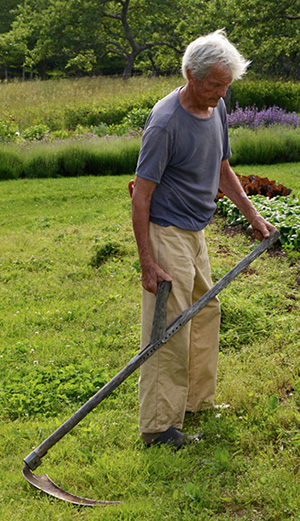
From Gardener to Cook
Eating from the garden will turn you into a cook, even if you arent one already. Putting delicious food on the table is something everybody can do, because delicious food does not need to be fancy. In fact, one of the first things you discover about homegrown produce is that you dont want to mess with it too much. Lively flavors beg not to be masked, over-seasoned, over-sauced, over-dressed, and above all, over-cooked. The best chefs have always known this, and kitchen gardeners soon learn to let their produce call the shots. In the second half of this book, we share some of the recipes weve created from our own harvests.
Gardening as a hobby is associated in some minds with leisuresomething people do when they have time, when their children have grown, when they have retired, when they own a place with a big yard. It is certainly a pastime that makes good times better. But food gardening is most popular when times are hard. Americans took up their shovels and planted war gardens during World War I and victory gardens in World War II, when there were food shortages and fewer wage-earning men at home. Depressions, recessions, and times of high unemployment are also times in which a packet of seeds seems like the best stimulus package a dollar or two can buy. And as well show throughout this book, it takes very little money to grow food, sometimes none at all. If you have a garden there will always be something to eat. Its good to know that.
For many people, time is the issue. Jobs, commuting, child-rearing, care of parentsthese are all limiting factors. But people with scarce time can often fit a garden in if they use efficient methods. On weekends, and during those golden hours in summer when the sun sets late, the garden can give you a way to unwind after a day of work. And usually when a family gardens, everyone gets involved to some degree, especially when kids are introduced to it at a young age. Even the oldest relatives can have their place, lightly cultivating a row or shelling peas. Some of the tools well introduce will make garden tasks surprisingly easy. Of the two of us, Eliot came to gardening in his late twenties, as an adventure. Barbaras family always loved growing food, especially her busy father, who felt that it lightened his load.

